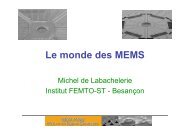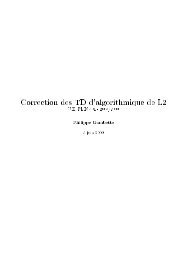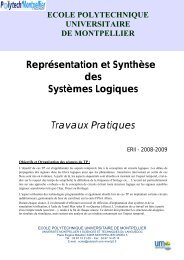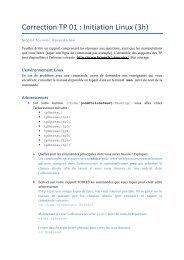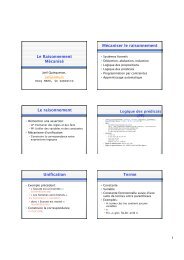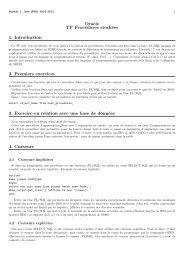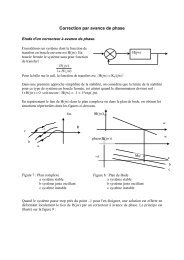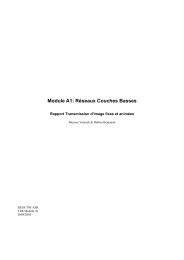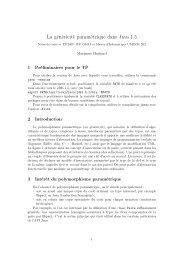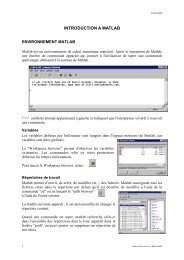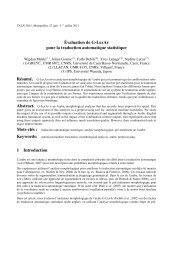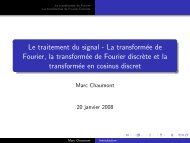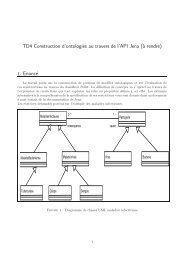Evaluating User Experience in Games: Concepts and Methods - Lirmm
Evaluating User Experience in Games: Concepts and Methods - Lirmm
Evaluating User Experience in Games: Concepts and Methods - Lirmm
You also want an ePaper? Increase the reach of your titles
YUMPU automatically turns print PDFs into web optimized ePapers that Google loves.
13 Us<strong>in</strong>g Heuristics to Evaluate the Overall <strong>User</strong> <strong>Experience</strong> 235<br />
(a) (b) (c) (d)<br />
Fig. 13.1 Different tabletop games. (a) NeonRacer 4 is an <strong>in</strong>teractive car-rac<strong>in</strong>g game, (b)PenWars<br />
is a sketch-based tank-war game, 5 (c) Com<strong>in</strong>o 6 is a dom<strong>in</strong>o game that comb<strong>in</strong>es the physical <strong>and</strong><br />
digital world, <strong>and</strong> (d) IncreTable 7 is a follow-up game from Com<strong>in</strong>o <strong>and</strong> allows one modify<strong>in</strong>g the<br />
digital terra<strong>in</strong> us<strong>in</strong>g physical (tangible) objects<br />
merg<strong>in</strong>g the real with the virtual (digital), enabl<strong>in</strong>g people to share the same experience<br />
(Dietz <strong>and</strong> Leigh 2001, Morris et al. 2006). Example applications are the<br />
STARS platform (Magerkurth et al. 2004), Augmented Coliseum (Sugimoto et al.<br />
2005), PlayAnywhere (Wilson 2005), PlayTogether (Wilson <strong>and</strong> Robb<strong>in</strong>s 2006) or<br />
MonkeyBridge (Barakonyi et al. 2005)<br />
Over the past four years, we developed different tabletop games (see Fig. 13.1),<br />
focus<strong>in</strong>g ma<strong>in</strong>ly on <strong>in</strong>teraction techniques. Dur<strong>in</strong>g the development we found that<br />
it is even more important for game designers to get a framework for identify<strong>in</strong>g<br />
usability problems both <strong>in</strong> early designs <strong>and</strong> <strong>in</strong> more mature prototypes.<br />
There is little research about the user performance of tabletop devices, <strong>and</strong> only<br />
few formal user studies are performed to demonstrate the real benefits of tabletop<br />
games. Most studies so far focus more on tabletop setups <strong>in</strong> general, <strong>and</strong> researchers<br />
evaluate <strong>in</strong>teractive tables more on a technical level (e.g. compar<strong>in</strong>g different <strong>in</strong>teraction<br />
metaphors). Besides our focus on measur<strong>in</strong>g user experience with heuristics<br />
of a broad variety of games, we provide methods for a more narrow <strong>and</strong> specific<br />
field of games: tabletop games.<br />
13.1.1 Overview<br />
Few approaches are currently l<strong>in</strong>k<strong>in</strong>g the results of heuristic evaluation methods<br />
to user experience. Especially <strong>in</strong> the field of computer games, where the experience<br />
is the lead<strong>in</strong>g factor, different aspects can be evaluated us<strong>in</strong>g heuristics.<br />
Therefore, we first put the ma<strong>in</strong> focus of this chapter on demonstrat<strong>in</strong>g the connection<br />
between heuristics for games <strong>and</strong> a game’s user experience. Next, we provide<br />
an overview of previously available heuristics <strong>and</strong> <strong>in</strong>troduce summarised heuristics<br />
4 http://www.neonracer.net/<br />
5 http://mi-lab.org/projects/penwars/<br />
6 http://mi-lab.org/projects/com<strong>in</strong>o<br />
7 http://mi-lab.org/projects/<strong>in</strong>cretable



